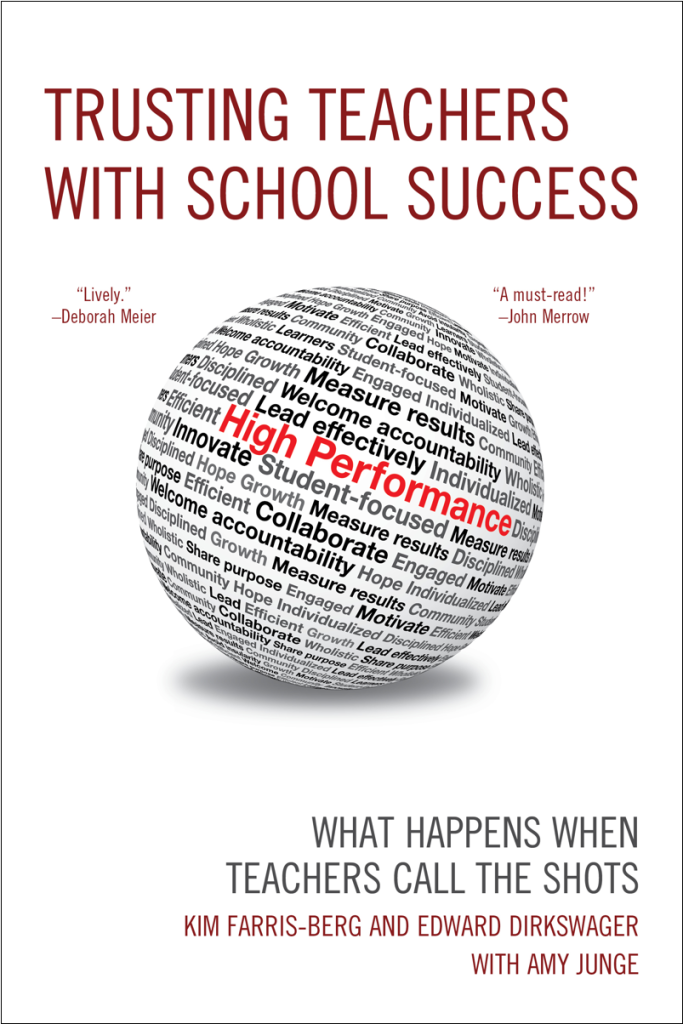Our nation’s current strategy for improving schools is largely focused on controlling teachers and school operations. A new book by Education Evolving senior associates Kim Farris-Berg and Edward Dirkswager advocates the opposite – that trusting teachers is the key to school success.
Trusting Teachers with School Success, to be released October 16, asks teachers what they would do if they had the autonomy not just to make classroom decisions, but to collectively—with their colleagues—make the decisions influencing whole school success. Examining the designs and cultures of schools where teachers already call the shots, the authors found that teachers participate in collaboration for the good of the whole school, not just a classroom.
The following is excerpted from Chapter 5:
With a strong sense of accountability for the success of the entire school, autonomous teachers collaborate for the good of the whole. When these teachers taught in conventional settings, they said, they felt accountable for their classrooms but not for their schools. Their principals were accountable for whole-school success, so teachers saw it as the principal’s job to support other teachers’ success and students’ overall success.
Stephanie Davis at Tailoring Academics to Guide Our Students (TAGOS Leadership Academy) explained autonomous teachers’ behavior:
Here we actually collaborate. [In the conventional school] where I worked before this there was little-to-no collaboration. There you’re only responsible for your own class. A little for what’s happening in your department. Not for the school. Here it’s all teamwork. We’re accountable for the whole thing, so we work together. . . . It makes us feel like, “This is my school.” It’s mine. I’m committed to it. It’s not just a place where I work.
Sue Rodahl at Academia de Lenguaje y Bella Artes (ALBA) said, “Collaboration at ALBA happens because of the structure that makes adults accountable to one another. There is more than one person accountable. I am a stakeholder. I’m accountable. If I made the decisions, then I’m willing to collaborate to make them work.” Nichole Kotasek at Minnesota New Country Schools (MNCS) said, “Elsewhere, you don’t have as much at stake. Here you feel obligated to participate. . . . [As individuals] we’re more likely to seek help and others are more likely to offer it. We know the school’s success depends on it.”
Autonomous and accountable teachers know that whole school success requires them to collaborate for students’ success outside of their own classrooms. Teachers work together to know their students as individual learners who have varying needs. “We’re all responsible for every student,” said Jack Stacey at High School in the Community (HSC).
Stacey and his colleagues remind themselves of this at every staff meeting. They spend thirty minutes discussing two individual students, one who is doing well and one who is struggling. Everyone collaborates to understand what works and what doesn’t work for those individuals, and implements those strategies whenever they see the students. “We all learn how to be better teachers,” said Heather George.
Laura Bowie described a similar collaborative culture at Chrysalis Charter School (Chrysalis):
In other schools we collaborated to discuss what curriculum we’d offer to all students in the grade level and subject we were teaching. We didn’t think a lot about what teachers in other departments were doing and how students were doing in other classrooms.
[To be successful here] we have to communicate about students’ whole experience. We need to know: Are students’ grades suffering in other areas? Are they managing well in other classroom settings? How do we differentiate learning so each student is challenged, but not overwhelmed? We’re always trying to make sure that every student has the right mix.
Trusting Teachers with School Success offers a significant departure from the standard literature about the role of teachers in education. It comes to us at a critical time in the ongoing debate about the future of education in the United States. If you want to learn more or would like to pre-order the book, click here.
